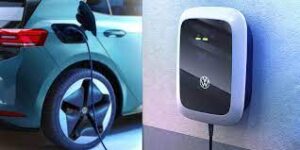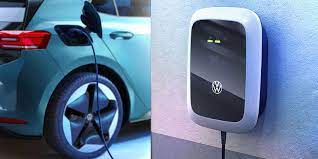The Complete Guide to Home EV Car Chargers
The rapid growth of electric vehicle (EV) adoption has spurred demand for convenient and efficient charging solutions. For many EV owners, installing a home EV car charger is the ideal solution, providing easy access to charging and reducing dependence on public charging stations. In this comprehensive guide, we will explore what an EV car charger is, the benefits of installing a home charger, and how these chargers work.
What is an EV Car Charger?

An EV car charger, also known as an Electric Vehicle Supply Equipment (EVSE), is a device that facilitates the safe and efficient transfer of electricity from an electrical source to an electric vehicle’s battery. Home EV chargers typically fall into two categories:
Level 1 Chargers: These chargers use a standard 120V household electrical outlet and come with the vehicle when purchased. Level 1 chargers are the slowest option, usually providing 3 to 5 miles of range per hour of charging.
Level 2 Chargers: These chargers require a dedicated 240V circuit, similar to those used for electric dryers or ovens, and can charge an EV much faster than Level 1 chargers. Level 2 chargers typically provide 10 to 60 miles of range per hour of charging, depending on the vehicle and charger’s specifications.
What Are The Benefits of Installing A Home EV Charger?
There are several advantages to installing a home EV charger, including:
- Convenience: Having a home charger allows you to charge your EV overnight, ensuring your vehicle is always ready for your daily commute or longer trips.
- Faster Charging: Level 2 home chargers offer significantly faster charging speeds compared to Level 1 chargers, reducing the time needed to fully charge your EV.
- Reduced Costs: Charging at home, especially during off-peak hours, can be more cost-effective than using public charging stations. Additionally, some utility companies offer incentives or lower rates for EV owners who charge at home.
- Increased Home Value: Installing a home EV charger can potentially increase your property’s value and appeal to potential buyers, as the demand for EV-ready homes continues to grow.
How Does an EV Car Charger Work?
An EV car charger works by converting the alternating current (AC) from your home’s electrical supply into direct current (DC) to charge your EV’s battery. Here’s a simplified overview of the charging process:
- Connection: To begin the charging process, the EV owner plugs the charger’s connector into the vehicle’s charging port.
- Communication: The EV charger and the vehicle establish communication, with the vehicle sending information about its current state of charge, maximum charging capacity, and other relevant parameters.
- Power Conversion: Based on the vehicle’s requirements, the EV charger supplies the appropriate amount of power, which is then converted by the vehicle’s onboard charger into DC to charge the battery.
- Monitoring: During the charging process, the EV charger continuously monitors the power flow, adjusting the charging rate as needed to ensure safe and efficient charging.
- Completion: Once the vehicle’s battery reaches its maximum capacity, the EV charger automatically stops the charging process to prevent overcharging.
Can I Power My EV Car Charger With A Renewable Energy Solution?
Yes, you can power your EV car charger with a renewable energy solution. One of the most common ways to do this is by integrating a solar panel system with your home’s electrical grid. By generating clean, renewable electricity from the sun, you can offset the energy used to charge your electric vehicle and further reduce your carbon footprint.
Here’s a basic overview of how you can power your EV car charger using solar energy:
- Install a solar panel system: First, you’ll need to install a solar panel system on your property. The system should be sized to produce enough electricity to meet your home’s overall energy needs, including charging your electric vehicle.
- Connect the solar panel system to your home’s electrical grid: Your solar panel system will be connected to your home’s electrical grid through an inverter, which converts the direct current (DC) generated by the solar panels into alternating current (AC) compatible with your home’s electrical system and the EV charger.
- Install a net meter: A net meter can be installed to monitor the energy produced by your solar panel system and the energy consumed by your home. When your solar system generates more electricity than your home uses, the excess power is sent back to the grid, earning you credits with your utility company. These credits can be used to offset the cost of any electricity you draw from the grid when your solar system is not producing enough power to meet your home’s demands, such as during nighttime or cloudy days.
- Charge your electric vehicle: With your solar panel system connected to your home’s electrical grid, you can now use the clean, renewable energy produced by your solar panels to power your EV car charger. By charging your electric vehicle during the day when your solar panels are producing electricity, you can maximize the use of solar energy for EV charging.
- Optional: Install a solar battery storage system: To further enhance your renewable energy solution, you can consider installing a solar battery storage system. This allows you to store excess solar energy produced during the day for use at night or during periods of low solar production. With a solar battery storage system, you can charge your electric vehicle using solar energy even when the sun is not shining.
By powering your EV car charger with a renewable energy solution like solar panels, you not only reduce your reliance on fossil fuels but also contribute to a cleaner, more sustainable transportation future. Additionally, using solar energy for EV charging can help you save on energy costs and may even qualify you for tax incentives or rebates, depending on your location and local programs.
Home EV car chargers offer convenience, faster charging speeds, and potential cost savings for electric vehicle owners. Understanding the basics of EV chargers and their benefits can help you make an informed decision about whether to install one in your home. With the growing popularity of electric vehicles, investing in a home EV charger can not only improve your driving experience but also contribute to a more sustainable and environmentally friendly transportation future.
…